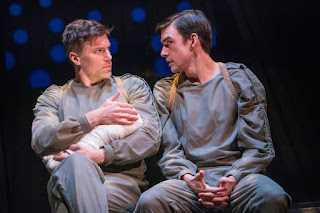Theater Review: A brilliantly funny Mankind explores gender roles
Mankind
Written and directed by Robert O’Hara
Starring Bobby Moreno and Anson Mount
Playwrights Horizons, Manhattan
January 14, 2018
There are many ways to explore religion. One could join a
church for immersion, read the Bible, Torah, Koran at home, read Karen
Armstrong’s A History of God (1993)
or any of her other excellent books, or travel around the world immersing oneself
in holy sites like the Vatican, Temple Mount, the Ajanta caves, etc.
Or one could head to 42nd St. to see Robert O’Hara’s
darkly funny play Mankind, which
covers more religious ground in 2 hours than most religious texts can in 700 pages.
At its simplest level, this is the story of two dudes (Jason and Mark) who, in
a sci-fi world in which women are extinct, have a baby. The precise anatomy and
physiology is not explained, and a lawyer unhelpfully tells us that after Woman’s
extinction, “Mankind adapted”. The thing
is, Jason and Mark’s baby is a girl, the first born in over a century, and they
(and the baby) become the subject of passionate religious fervor by zealous adherents
of the new Feminist religion, banned by the patriarchal state. I won’t share
too many more details, since this play revels in the precise ways in which a
religion is formed, propagated, and indulged in by believers. It is a marvelously
funny journey, one in which you may well yourself participate in a religious
rite, indulge in idol worship, and find yourself laughing at your own or others’
religiosity. Yet, like The Book of Mormon,
I can imagine this play being equally enjoyed by believers, doubters, and skeptics.
What both plays have in common is a warmth and earnestness that lets neither degenerate
into pure mockery. In Mankind this is due equally to a brilliant script and equally
adept direction by the playwright and totally convincing performances by the
players.
Besides “What is Religion”, the play’s other big theme is “Who
are Men?”. This is not a gay play, despite the male-male childbearing. The
playwright is creative and funny as he plumbs the depths of an all-male
society, one where testosterone is always near the surface. The two leads are each
distinctive as the “romantic” couple: Bobby Moreno and Anson Mount play off one
another with split-second comic timing and a very delicate tension between two
straight-acting “guy friends” and the two parents of a new baby. O’Hara deftly explores
their immature “guy” obsession on sex-only relationships (now without women
around to limit their promiscuity) vs. their very grown-up and very coupled new
responsibilities. All this is a terrific metaphor for the connectedness or (lack
of it) between sex, love, marriage, and childrearing. Despite women’s absence
from the play, it is very much about them too, since their absence makes them
even more exotic and, for some, worshiped. It also makes one rethink in new
ways all the issues with teen pregnancy, abortion rights, and same-sex adoption
and parenting. In a way, this play is a very big extended metaphor that works on
many levels and challenges the viewer to draw his own analogies.
The religious theme is developed concurrently with the above
sex-gender confusion, and is also wonderfully executed. One does not always get
to be present at the founding of a new religion: we hear about how the new Feminists
act, what they want from their “gods”, and how a new “Bible” arises. Deities Jason
and Mark nearly buckle under the pressure of knowing that every word they utter,
whether in anger, jest, or seriousness, is being recorded for inclusion in a holy
book of worship. The way in which two dudes who would rather be left alone
(except for the monetary profit that accrues from all this) yet become
religious icons is handled deliciously by the playwright. Certain casual (and
profane) conversations are repeated throughout the play rather like Gregorian
chant, transforming the whole play into a sort of religious service like one of
the Passion Plays of old. I was vastly amused that on one Sunday morning I
chanted the Lutheran rite of confession as part of my church choir gig, then
heard nearly the same words during the play, adapted for the new religion. Mankind is that sort of play, easy to
appreciate on a number of levels.
Kudos should also be offered to the rotating cube set design
of Clint Ramos, looking rather like the house of the future at 1960s
Disneyland, some creative riffs on how obstetrics evolves in the future, and
the excellently chosen music/sound design of Lindsay Jones, rich with macho unison
male choruses and religious music ranging from “Amazing Grace” to Gregorian
Chant. In the supporting roles, past Tony-nominee André De Shields did a couple of
memorably funny star turns as a lustful lawyer.
Given this playwrights’s
background in short vignette-like plays and one act comedy, it is very
propitious to see him write such an extended, structurally sound, and
consistently funny play that touches on so many modern political and religious issues
so effectively. I look forward to Mr. O’Hara’s next effort, and strongly encourage
you to see this play if it comes to your area.


Comments
Post a Comment